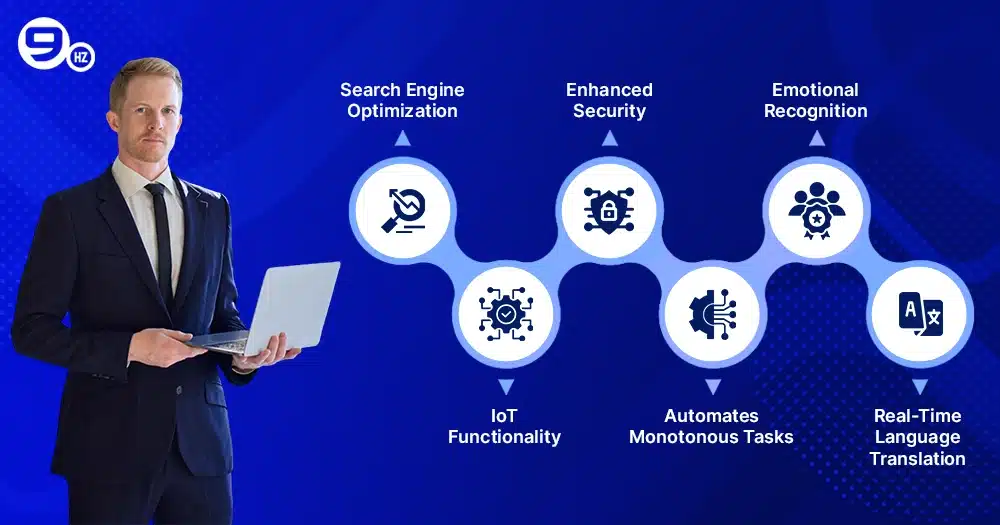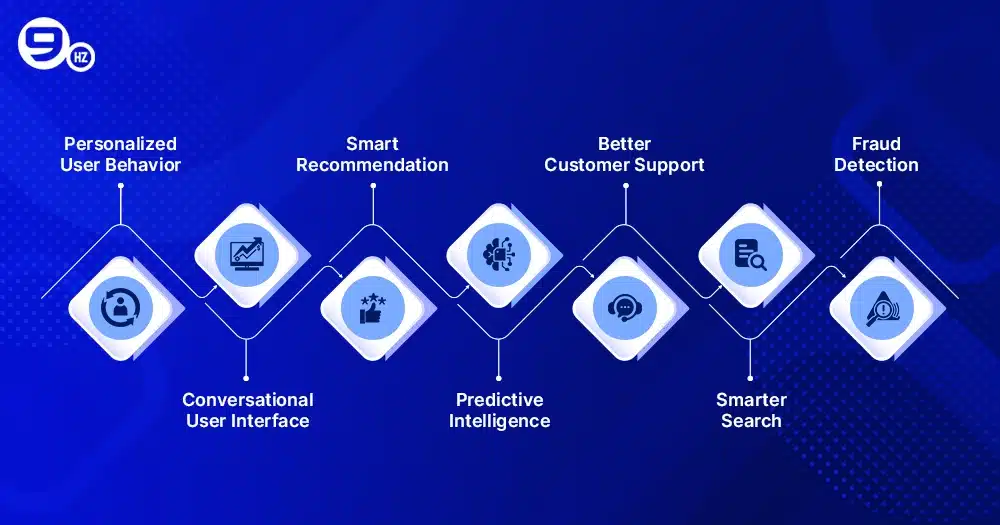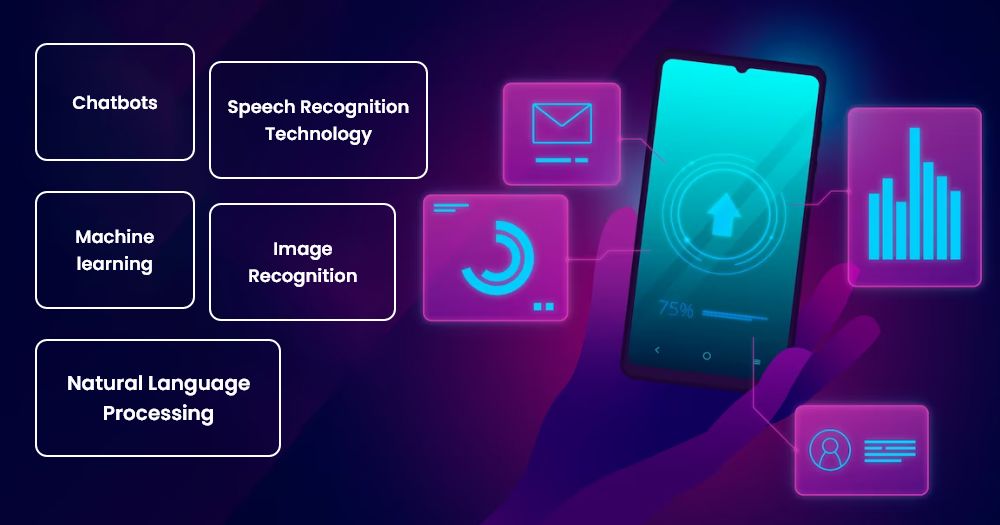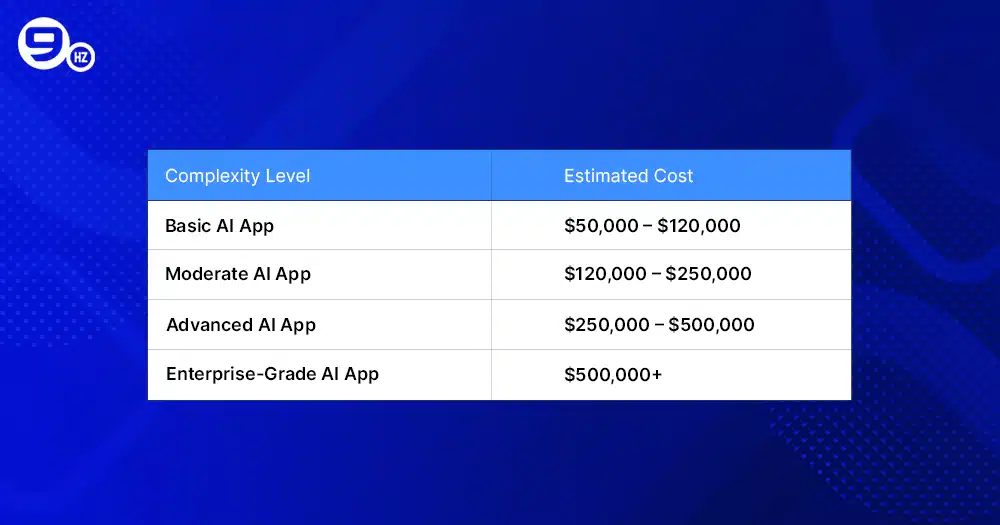There are millions of mobile apps available on marketplaces like Google Play Store and Apple App Store. If you want to build a mobile for your business with a vision to connect to the customers and strengthen your position, you are almost there, but not alone. Building just a platform that allows users to shop for your store is not enough. That’s where AI in mobile app development is now helping businesses to be a step ahead and secure a good ROI.
According to Grand View Research, the global AI apps market was valued at approximately USD 2.94 billion in 2024, is projected to grow to USD 5.13 billion in 2025, and reach around USD 26.36 billion by 2030, reflecting a compound annual growth rate (CAGR) of about 38.7% between 2025 and 2030. The businesses that invested in websites and mobile apps a decade ago secured a good return, and now the businesses that will incorporate AI in their mobile apps are going to be the next unicorns.
So, if you are also looking to build an AI mobile app but have no idea of where to start, how to start, and what it takes to be on that side, give a read to this article, and you will have the answer to everything.
How AI is Elevating Mobile App Functionalities

1. Search Engine Optimization
Building a mobile app is no longer sufficient, as you will have to inform the targeted audience about your platform. So, AI helps in building mobile apps that are SEO and app-marketplace-friendly. Artificial intelligence analyzes large data volumes to enhance the content relevance, understand user intent, and automate keyword research that helps the application perform better at the App Store and Play Store. At the same time, it also helps to optimize content, discover high-quality backlinks, and tailor the mobile experience according to user search to offer a competitive edge.
2. IoT Functionality
If you are building a mobile app that works in collaboration with other devices like smart watches, smart home appliances, or POS machines, artificial intelligence helps foster the IoT functionality. It means that the end user will be able to control the associated devices just from their smartphones. At the same time, it can even track the user behavior to make informed decisions. For example, if a user turns off the AC in the middle of the night, the app will automatically learn from it and turn off the AC without the manual command.
3. Enhanced Security
Security and privacy are the top concerns of users nowadays. So, artificial intelligence brings a strong security layer to the mobile app that fosters highly efficient locking functions. For instance, it can enable face locks and biometric locks. Also, it can use geofencing to control the security levels based on the device location. Moreover, the app can track suspicious activity like someone trying to unlock a file or device. On such an action, it can temporarily hide the file and inform the user about the same.
4. Automates Monotonous Tasks
Artificial intelligence is highly used to impart automation that eliminates the need for users to perform the autonomous tasks, thus saving a lot of time and effort. For instance, AI can eliminate the need for a user to input the command from scratch each time. It can actively track the usage patterns and make informed decisions to enhance the customer experience.
5. Emotional Recognition
AI transforms a machine into a technical counterpart that not only performs the task but also tracks the users’ emotions to behave accordingly. Such apps are capable of capturing human senses, facial expression, and voice intonation that help to execute the task according to the user’s mood. For example, AI integrated into a video streaming mobile app will make it easier to sense the users’ mood and suggest movies in relevant genres.
6. Real-Time Language Translation
The integration of AI in mobile app development makes it very easy to make the software accessible to a global audience. Artificial intelligence has the capability to continuously expand its knowledge base. Thus, features like real-time language translation can scale according to emerging vocabulary and phrases used in different languages. The device can even locate the place to offer assistance to the user in understanding the language of the surrounding people.
Launched in June 2025, the AI fashion app Alta went viral multiple times and quickly secured $11 million in seed funding. It now consistently ranks in the U.S. App Store charts.
7 Key Benefits of Integrating AI in Mobile App Development
AI in mobile app development might increase the building cost but offer the unique benefits that not only elevate the returns but also contribute toward the best user experience and excellent competitive advantages-
1. Personalized User Behavior
Despite the category of your business domain, it is highly challenging to establish a good relationship the customers when brands are leaving no stone unturned to snatch them from you. So, artificial intelligence helps you to understand your user behavior to offer a personalized experience that increases the customer retention rate. For instance, a hospitality business can track the preferences of its guests to make arrangements in hotel booking, restaurant reservation, and travel tickets according to their preferences.
2. Conversational User Interface
User interface plays a big role in defining the usability of mobile apps. Therefore, artificial intelligence allows businesses to leverage a conversational user interface, which makes it easier for the end-customers to easily navigate through the pages, embrace features, and find the product or service they are looking for.
3. Smart Recommendation
Have you ever noticed how Netflix suggests the movies that you like to watch, or how the ads of products or services that you like pop out on your screen out of nowhere? It is called the smart recommendation. AI implementation in mobile app development allows businesses to track user preferences and then show the relevant products or services. This strategy helps significantly to lead a successful purchase without spending thousands on PPC or ads.
4. Predictive Intelligence
AI brings predictive analytics capabilities into the platform that help significantly in optimizing stock and inventory levels. Whether you work in manufacturing, retail, or e-commerce, always make sure that you have the right inventory amount to avoid overstock or stockouts. The solution actively tracks the market trends, historical sales, and customer behavior to accurately predict the future demand of a product or service.
5. Better Customer Support
Customer support is undoubtedly a key to sustainable business growth in the competitive arena. Artificial intelligence helps brands to offer excellent and personalized customer support to establish better relationships with the end users. AI chatbot helps brands to offer instant, accurate, and personalized support while reducing the reliance on the human workforce. At the same time, it also ensures that customers are connected to the right professional by actively monitoring the query category. AI even encourages self-service portals where the customers can get their queries resolved by themselves.
6. Smarter Search
AI unlocks the smart search functionality in a mobile app that allows users to search for content, products, or services using voice, images, or text commands. The function eliminates the need for the user to scroll through the pages and search results to get what they were looking for. This feature significantly elevates the overall user experience with the brand.
7. Fraud Detection
FinTech mobile apps are always the target of hackers and data breaches. So, AI in mobile app development allows banks, insurance companies, and other financial institutions to strengthen their security protocols. The system consistently tracks the transactions to detect the anomalies. As soon as any uncommon event is recognized, it instantly informs the system to deploy the protective measures. At the same time, it also informs the concerned authorities about the breach even before it is completely executed.
Convert Your App idea into Reality
AI Technologies for Mobile Apps That Bring the Changes
There are a lot of day-to-day AI technologies that have bought changes to mobile apps and thus consumer experience. Being a smartphone and internet user, you must be familiar with all or a few of these names which have managed to secure their space in every business case study.
1. Chatbots
You must have noticed that small button in the corner of most websites and applications, called a chatbot. There used to be a time when a complete team of customer support had to sit in front of the screen, waiting for messages and replying manually. However, AI-integrated chatbots have transformed the scenario completely.
One of the key benefits of AI chatbots is their ability to provide instant, automated responses without requiring a human workforce. When you put a query on the chatbot, the response is given by an artificial intelligence robot. The technology is smart enough to analyze the problem, question, or feedback submitted by the user and provide a suitable response based on trained data.
As an AI chatbot development company, , we specialize in creating intelligent chatbots that operate 24/7, delivering quick solutions and significantly enhancing the user experience.
2. Speech Recognition Technology
This is another widely used AI technology for mobile applications. Giving commands has become significantly easier with this concept where even if a person doesn’t want or know how to type, the technology converts human speech into a language that can be understood by the computer and give the output. Integrating speech recognition technology in mobile app development helps to receive input from users in an easy form and then utilize the right feature and functionality to give the output.
3. Machine Learning
Many businesses are utilizing machine learning technology in their mobile application, allowing them to learn the user behavior and provide a personalized experience. A recommendation system is one of the best examples to understand the application of machine learning where a company suggests the product, service, or content according to your interest.
Take Netflix for instance, as soon as you are finished watching a movie, it will instantly send you the recommendation for another similar film and chances are that you will end up watching it too. That’s how machine learning ties a customer to a service.
4. Natural Language Processing
This AI technology is rapidly becoming familiar to a big audience base, eliminating the need for a human translator. You must have enjoyed its features in numerous apps in the form of voice-operated GPS systems, digital assistants, customer service chatbots, speech-to-text dictation software, and many other consumer conveniences. Natural language processing basically enables computers to process human language in the form of voice data or text.
5. Image Recognition
Image recognition is a comparatively new technology that can recognize objects, texts, and various things from a digital image or picture. Google Lens is a good example to define the application of an image recognition system which makes it easy for internet users to find similar visuals, identify strange objects, and much more.
AI Mobile App Development Pricing Breakdown in 2025
The average AI app development cost generally ranges from $40,000-$300,000. However, the exact development cost is highly variable as it is influenced by a range of factors. For instance, the number of features in the mobile app is directly proportional to the development cost. It means that the cost increases along with the number of features. Therefore, the exact development cost can only be determined after a thorough analysis of business objectives and project goals.
Here are some of the factors and their influence on AI mobile app development cost-
1. Data Availability
AI models are entirely dependent on high-quality data to provide accurate results and automate processes. If your business already has a well-structured and required dataset, it can lower the app development cost to a significant extent. On the other hand, if you need to source data from external sources, it might require some data purchase charges that add to the development cost. The estimated cost of sourcing the data, depending on its volume and quality, might range from $5000-$30,000.
| Data Requirement | Estimated Cost Impact |
|---|---|
| Pre-Existing Datasets | $5,000 – $10,000 |
| Data Cleaning & Preparation | $10,000 – $20,000 |
| Data Acquisition | $15,000 – $30,000+ |
2. Project Complexity
The complexity of the project and mobile app has a big influence on the development cost. For example, if you want to implement AI in mobile app development just to bring an efficient customer support chatbot, the project can be executed at a limited cost. On the other hand, if you want AI to foster predictive analytics, personalized recommendations, and other advanced features into the app, the cost will increase as it will be a resource-intensive task.
| Complexity Level | Estimated Cost |
|---|---|
| Basic AI App | $50,000 – $120,000 |
| Moderate AI App | $120,000 – $250,000 |
| Advanced AI App | $250,000 – $500,000 |
| Enterprise-Grade AI App | $500,000+ |
3. Technology Implementation
The technology stack says a lot about implementing AI in mobile app development. Integrating technologies like machine learning, natural language processing, artificial intelligence, predictive analytics, AI-chatbots, and much more requires human as well as technical resources. Therefore, hiring AI human professionals in the team adds to the overall development cost.
| Technology Choice | Description | Estimated Cost Impact |
|---|---|---|
| Open-Source Frameworks | TensorFlow, Scikit-learn, PyTorch – no license fees, but needs skilled developers. | $8,000 – $20,000 |
| Cloud AI Services | AWS AI, Azure Cognitive Services, Google ML – pay-per-use charges. | $15,000 – $35,000 |
| Custom AI Models | Fully customized models trained from scratch. | $30,000 – $50,000+ |
4. Project Timeline
Most mobile app development projects hire developers on an hourly basis, which allows the client to pay the development partner for the time and resources they have spent while working on the project. Therefore, the projects that take more time to complete often turn out to be expensive.
| Timeline | Impact on Development | Estimated Cost Impact |
|---|---|---|
| Standard (6–9 months) | Optimized resource allocation, balanced pace. | $5,000 – $10,000 extra |
| Accelerated (3–6 months) | Overtime costs require a larger team. | $10,000 – $20,000 extra |
| Urgent (1–3 months) | Premium rates, High resource demand. | $20,000 – $25,000+ extra |
5. Location of Development Team
The location of your development team has a significant impact on the cost of AI mobile app development. The reason behind the particular statement is that hiring software developers from the USA, UK, Australia, and many European countries costs more than twice as compared as hiring the developers with the same skillset from Asian countries like India.
| Region / Country | Average Hourly Rate | Estimated Project Cost |
|---|---|---|
| USA / Canada | $100 – $200/hr | $80,000 – $150,000+ |
| Western Europe (UK, Germany, France) | $70 – $120/hr | $60,000 – $120,000 |
| Eastern Europe (Poland, Ukraine, Romania) | $40 – $70/hr | $40,000 – $80,000 |
| Asia (India) | $20 – $50/hr | $20,000 – $60,000 |
6. Third Party Integration
Mobile apps generally require the support of third-party platforms to bring certain functionalities. While some of the third-party platforms and APIs are available for free to integrate, others might incur some charges. Therefore, the type of third-party integration that is required in the mobile app also influences the development cost.
| Integration Type | Examples | Estimated Cost Impact |
|---|---|---|
| Payment Gateways | Stripe, Razorpay, PayPal. | $3,000 – $8,000 |
| AI APIs | OpenAI, IBM Watson, Google Vision. | $5,000 – $15,000 |
| Analytics & CRM | Firebase, Salesforce, Mixpanel. | $5,000 – $20,000+ |
5 Real-Life Use Cases of AI in Mobile Apps Worldwide
While AI in mobile app development is a new concept, it is already being used by some of the market leaders to better connect with their users and offer a better experience to their customers. Let’s understand how artificial intelligence is already making big changes in leading mobile apps-
1. Canva

2. WhatsApp
WhatsApp is one of the biggest online messaging apps with more than 3 billion monthly active users, which accounts for around one-third of the global population. The platform utilizes AI to enhance its user experience. The Meta AI feature integrated into the mobile app allows users to generate images, ask for assistance, get answers, search for chats, plan meetups with friends, and much more.
3. Instagram
Instagram is one of the largest social media platforms in the world, which has recently introduced some AI features into its app. The Meta AI helps users make changes in their content on Instagram and redefine the way they talk to their friends using the platform. For instance, the users can now leverage AI features to remove background, change outfit, add objects, and much more. At the same time, Instagram also allows the user to train AI to act as a chatbot for interacting with the audience.
4. Duolingo
Duolingo is a language learning platform trusted and preferred by millions of users to learn new languages at their own pace. The app was founded in 2011 and now uses AI to enhance the experience of its learners and foster a better teaching approach. For instance, AI is used in the platform to identify the common mistakes made by the user and suggest corrections. At the same time, the new AI system Birdbrain allows Duolingo to analyze the entire learning journey of the users to offer a personalized experience.
5. LinkedIn
LinkedIn is the biggest professional platform in the world that connects employers to talent and bridges a very important gap. The platform is highly used to get jobs, hire skilled workforce, share working experience, post regarding skillset, and much more. LinkedIn has also introduced a new AI feature into its platform that allows users to get writing assistance for their posts, ad copies, job descriptions, and even offers learning modules around AI.
The Process to Implement AI in Mobile Apps
While each application integrated with artificial intelligence delivers a different use case, the process of implementing the AI also changes from time to time. However, there are certain steps that allow the easy and seamless integration of AI in mobile app development. Here are the vital steps of this process-
1. Identify the Challenges
The very first step is to identify the challenges that have to be addressed by AI. It helps to prioritize the challenges and decide upon the technology that can be used well to solve those particular challenges. So, it becomes easier to maximize the benefits of AI implementation in mobile apps and solve the challenge.
2. Data Analysis
Artificial Intelligence works entirely on the basis of data collected and then processing the information to provide the best output. So, the second step in the process is to understand where the data will come from along with the quality and quantity of data. Once the sources of data have been identified, a data analytics tool is used to govern and organize the data in a manner that it can be fed to an AI model.
3. Metrics Implementation to Measure
Metrics refers to the key performance indicators. Here, you must set some milestones that must be achieved by the use of AI apps. It helps to identify how much value the app delivers in the task. At the same time, this milestone helps significantly to put the right functionality during the installation of AI in mobile apps.
4. Solution Implementation
This is the core phase of the process which requires the expertise of engineers and developers in AI technologies. The development team installs the AI capability in the mobile solution as well as analyzes the potential chances of pitfalls that might be confronted in the future. So, these kind of errors are fixed instantly.
5. Work on Integration
Most of the time, AI-based applications fetch data from third-party sources and tools. So, different types of APIs are integrated into the mobile app development process to bring the benefits of data. However, the higher the AI capabilities, the lesser will be the need for APIs.
6. Result Monitoring
As the name suggests, this is the final phase where the output results of AI apps are monitored to see if the outcome matches the vision or not. The functionality of the app is checked and necessary improvements are made.
The Future of AI in Mobile App Development
It’s not even half a decade since AI became familiar to laymen in their day-to-day life. Still, the technology has greatly redefined the workflow and mechanism of millions of tasks. However, this is only the beginning, and there is still a lot to unfold in the realm of AI and app development. Let’s have a glimpse of new trends that we might soon witness with the role of AI in mobile app development-
1. Hyper-Personalization
The future might bring the option for hyper-personalization in mobile apps that will consistently analyze the mood, context, and user behavior to show content, perform tasks, and suggest products/services accordingly. For instance, a fitness mobile app will soon be able to detect the stress level of the user from their voice or heartbeat to curate or shape the workout plan accordingly.
2. Multimodal Interfaces
While the multimodal input, where the user can use images, voice, or text to give the command, is already in existence, the technology is expected to be more common in the coming decade. For example, the food delivery app will allow the user to order food using the images of a dish, defining the key ingredients vocally to the AI bot. It will streamline the user journey to a great extent, where they can get relevant results even with the limited information.
3. On-Device AI
In the current scenario, most of the AI services are available merely on the cloud, which requires users to be connected to the internet in order to access the features. However, it is expected that the new updates might bring the AI capabilities to the device that will allow users to leverage AI features in the offline mode. How amazing it will be when you can ask the AI to edit a picture of yours to post on social media, even when you are not connected to the network.
4. Context Aware AI
AI in mobile app development can help developers to impart context-aware AI capabilities that allow the system to give suggestions, perform tasks, and make decisions, on the basis of surroundings and environment. For example, an AI-based transportation app will automatically fetch the details like weather, location, user preferences, and calendar habits to suggest and book the best transportation option.
5. AI-powered AR/VR Experiences
Augmented reality and virtual reality are currently limited to very few use cases, and thus, the upcoming decade is expected to make them a part of everyone’s lives. Whether it is immersive shopping, training experiences, or redefining the way of gaming, artificial intelligence is soon going to move people from screen to virtual elements that they can experience in their surroundings.
Why Choose The NineHertz for AI-Powered Mobile App Development?
There is no doubt in the fact that AI in mobile app development can help businesses to embrace competitive advantages, strengthen their relationship with customers, and offer a good ROI. However, it is highly important to partner with the right AI mobile app development company to leverage these benefits.
The NineHertz is a leading artificial intelligence development company with an experience 12+ years of experience. We have a team of 250+ experts carrying specialization in their respective fields. Here are the core competencies that make us the best choice for imparting AI in mobile app development:-
1. Industry 4.0 Specialization
In order to bring advancements in a mobile app, it is crucial for the team to be familiar with all the relevant technologies. Therefore, The NineHertz carries exceptional expertise in technologies like artificial intelligence, machine learning, natural language processing, metaverse, AR/VR, and much more. We integrate the best technology that aligns with the real-time business needs and project goals.
2. Cost Efficiency
We are partnered with businesses of different sizes and investment capabilities. Thus, we offer the AI mobile app development services while ensuring cost efficiency without compromising the project quality. It helps us to make AI accessible to a larger audience. At the same time, we are familiar with real-time development challenges and their mitigation strategies that help us save cost during the overall development lifecycle.
3. Free Consultation
NineHertz offers free consultation to businesses looking to integrate AI in mobile app development. In this session, our experts collaborate with the client to efficiently identify and understand their goals and real-time challenges. On the basis of exchanged information, we curate a personalized development roadmap to give an accurate estimation of required resources, project timeline, and overall cost.
4. Least Time-to-Market
We understand how important it is to be the first one in the industry to attract the target audience. Therefore, we ensure the least time to market, which allows us to deliver the project within the defined timeframe. At the same time, deploying the project in the least time also reduces the project timeline, which further lowers the development cost.
5. Non-Disclosure Agreement
Our team respects the privacy and safety of all the data related to clients and projects. Thus, we keep NDA at the center of the process, which makes sure that any information related to the client or project is kept confidential between the concerned parties, and no third-person doesn’t has access to this information without the mutual consent.
6. Maintenance and Support
We offer ample maintenance and support after the deployment of software to ensure that all the functionalities are working according to the defined standards in the live environment. At the same time, our developers consistently work on identifying and removing bugs to foster a seamless user experience. Our team tracks the emerging market trends to provide periodic updates to mobile apps that eliminate the unnecessary features and add new trending features.
Conclusion
AI in mobile app development is reshaping the way people consume digital services. Whether it is editing a simple photograph or getting customer support from their favorite brand, everything is now fast and more efficient. Not only does it bring accuracy and speed, but artificial intelligence also helps businesses to offer personalized experiences to their customers to strengthen the relationship. The technology has given marvelous returns on businesses in the last decade.
If you are also a business owner or someone looking to build an AI-powered mobile app, we invite you to a free consultation session with our experts, where we can discuss the requirements and make an informed decision. Fill out the form, and our team will reach out to you.
Frequently Asked Questions (FAQs)
What are the benefits of AI in mobile app development?
Answer- There are numerous benefits of AI in mobile app development, which include-
- Personalized User Behavior
- Conversational User Interface
- Smart Recommendation
- Predictive Intelligence
- Better Customer Support
- Fraud Detection
- Smarter Search
How much does it cost to implement AI in mobile app development?
Answer- The cost range of AI in mobile app development is $40,000-$300,000. However, the exact development cost is highly variable as it depends on a range of factors like-
- Data Availability
- Project Complexity
- Technology Implementation
- Project Timeline
- Location of Development Team
- Third Party Integration
How much time does it take to build an AI-powered mobile app?
Answer- It might take anywhere between 4-12 months to build an AI-powered mobile app. The development timeframe is influenced by a number of factors, like project complexity, team size, hiring model, customization, third-party integration, development platform, and much more.
What are some of the best AI mobile app technologies?
Answer- Some of the best mobile app technologies are-
- Biometrics
- Speech recognition
- Natural language processing
- Machine learning
- Text recognition
- Image recognition
- Sensory recognition
- Voice recognition
- Augmented reality
- Virtual reality
- Emotion recognition
Great Together!










![Building Agentic AI Applications with a Problem-First Approach [2026 Guide]](https://theninehertz.com/wp-content/uploads/2026/02/Building-Agentic-AI-Applications-with-A-Problem-First-Approach.png)





